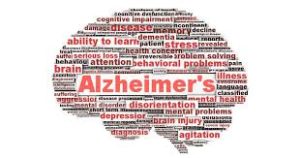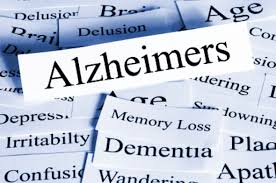The easy answer? No I don’t….at least I don’t THINK I do. But I’ve had it in my family. And it’s horrible. My mother — the most independent and self-sufficient person I’ve ever known — died from complications from Alzheimer’s 10 years ago. It destroyed her in 3 short years and in doing so, brought my entire family to our knees.
Alzheimer’s is THE medical scourge of our generation. Why? It steals everything we hold most important to us: relationships with everyone, long-term memories, short-term memories, communication with others, understanding and coherence that we all take for granted today. Most horribly is it steals our identity.

Most everyone knows someone touched in dramatic ways by this horror — either family members, friends, people in their communities, or all of the above. One of my good college friends who lives in the Houston area is going through it right now with her mother. She writes of her daily frustrations coping with her mother living with her, the distractions that causes, and how much has been stolen from her mother AND her. If you haven’t dealt with Alzheimer’s on a personal level yet, you will. And when it strikes, get ready.
I was not prepared for my Mother’s Alzheimer’s diagnosis. And it came from a scary moment. My mother — a widow — had lived alone and very independently for 20 years in a city 200 miles from where my brother and I live. Without warning we received a phone call in the middle of the night from the neighbor who lived close to Mom. She had just rang his doorbell, was standing on his porch in cold, pouring rain in just her nightgown, and asked our friend, “Can you help me? I don’t know who I am or where I live.”
That’s just how fast it can and often does happen. And when it happens, everything changes. So how do those who have that family member who is transitioning into Alzheimer’s cope with the unforeseeable life changes? There’s no magic pill that gives instant understanding and a Alzheimer’s care outline. And even though there are multiple books, online how-to articles, and printed manuals, none are 100% accurate for your Alzheimer’s care needs simply because no two cases are identical.
But there are similarities and some commonalities to understand in preparation for the part that is unforeseeable. Here are some thoughts:
- Your Alzheimer’s patient is as afraid as you are. Although it will always be hard, do not put your fear on top of their fears. There is no cure for it and they know that;
- No matter how they act or what they do, they are still human and still deserve the rights and dignities they had in their setting with you before their Alzheimer’s. No doubt adjustments that themselves are ever changing are unnerving and very seldom timely, but they happen. You must find a way to cope with each as they show up without falling apart;
- Refuse the temptation to withdraw from them. No doubt that would ease the constant pressure you feel dealing with their disease (especially if you are their primary care giver), but your withdrawal will only increase your guilt and decrease your understanding of exactly what is going on and will have the identical effect on them. Remember this one thing: they need you now more than ever;
- Don’t hesitate to reach out for help. If for financial reasons you cannot consider a residential option for them or professional mental health (for them AND you), there are numerous non profit entities in almost every community that can assist you with copious amounts of detailed information about the disease, its various effects, treatment options, treatment drugs, and if nothing else just be there for you to unburden yourself with the certain mounting cares of the daily tasks associated with Alzheimer’s. Do not hesitate to reach out for whatever help and all the help you need as soon as you do need it if not before;
- Maintain as close a personal relationship with them as long as possible. An Alzheimer’s patient deserves to be loved and cared for and to hear and see that from those close to them. After all, they may have this disease, but they’re still your grandmother/grandfather, mother/father, sister/brother, aunt/uncle, and that will NEVER change. When you are tempted (and you will be) to be angry and lash out, just remember this: whether you call it Karma, “what goes around comes around,” “reap and sow,” or “you get what you give,” you will get something from how you treat them, not to mention they will too;
- Don’t feel guilty for wishing they were gone. It happens. Human nature dictates that hardly anyone is built to take the 24-7 onslaught of continual pressure and unpredictability of caring for an Alzheimer’s patient. Wishing for an escape is normal. When it comes, just stop, take a deep breath, and tell yourself “this too will pass,” because it will. They WILL be gone eventually. What you do not want is to build a wall of self protection or withdrawal while they are still with you. When they are gone and you have done so, you face an additional unexpected task of dealing with the guilt of what you have or have not done. Do not add any unnecessary issues. There are plenty enough there for you to face.
What to Say While you Can to Your Family If You’re the one with Alzheimer’s
Wow! It could happen to you. And preparing those in your life and not just you for it can be just as critical. You might even write a letter to them with your thoughts and desires about how to handle your Alzheimer’s. But what is critical is that you comfort them about how you feel.
If I wrote a letter to them, here are the things I would say: “Pray and trust God to guide you. Get as much help as you can. I don’t want you to sacrifice your life plans or family for my sake, but I want to always be part of your life. If medical care for me in my home becomes impractical and you need to find a nursing home for me, I understand. Pray about it and seek wisely. And then visit me often. Even if I don’t seem to know you, believe in your heart that part of me does. Hold my hand and talk to me. Tell me all about your life. Sing to me and read the Bible to me, please. Tell me memories of your childhood. If I can still chew, bring me chocolate! Please have my grandchildren come see me too. Yes, it will probably be scary and uncomfortable for them, but I am still their Poppi, no matter what. And when we cannot talk anymore, please still talk to me. Know this: I’ve been proud for you to be mine and to know you. Thank you in advance for loving and caring for me to the end. And know this: we’ll talk again.”
Let them know that Alzheimer’s as horrible as it is is just a step in life — from somewhere to somewhere else. It’s a transition.
People with dementia are still people. And God still has a plan for their lives. Even when they are bedridden and can do nothing at all, maybe their very life keeps us clinging to God more. Maybe their very existence draws us closer to God as we seek Him and cry out to Him. He will always be there with us in everything we face. He doesn’t leave us alone.
One last note: even though I had years to prepare for her passing, when Mom went home it devastated me: she was still my Mom. It’s easiest at that point to concentrate on life before Alzheimer’s. Find the joy. Concentrate on the good times. Remember the funny things. And laugh. She’d like that.


Good insight into one of life’s biggest regrets…
The loss of a memory is a devastating opponent that we don’t have an answer for without His grace. This was filled with so much wisdom.